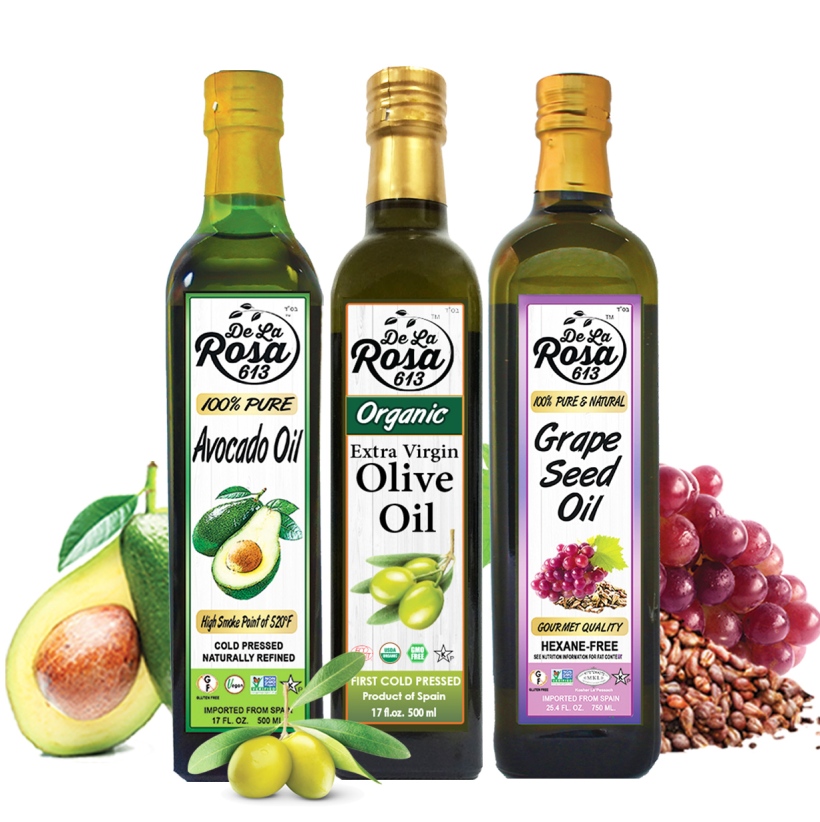Have you recently been standing in aisle 3 of your local grocery store in need of cooking oil, planning to make a quick pick and instead find yourself completely overwhelmed? When it comes to choosing the right culinary cooking oil, it might be hard to decide where to start. While the internet is flooded with often contradictory information about cooking oils—bogus health claims and cooking myths, just to name a few—it’s best to compile reliable information and understand how the oils are processed and which is best for your particular cooking style.
We sat with Yehudith Girshbeg, CEO of De La Rosa Real Foods & Vineyards, who shared, “Consumers are being persuaded by mass-marketing to believe that some popular, widely used oils like canola, corn, and soybean are “healthy.” But once educated on how these oils are made, it’s clear they are totally unhealthy and overprocessed.”
For more than 30 years, De La Rosa Real Foods & Vineyards has been committed to helping consumers make healthier food choices by providing products that are non-GMO, gluten-free, vegan, kosher (many Kosher for Passover) and organic whenever possible. This specialty food manufacturer is also committed to providing education to consumers as to what is healthy and what’s not. De La Rosa offers a large assortment of healthy oils, vinegars and wine.
In fact, not all oils are created equally. Many of the oils we use today in the kitchen are made from seeds. In order to get the oil from these tiny seeds, they can either be mechanically or chemically processed. These processes are known as solvent extracted, expeller pressed or cold pressed. Most solvent extracted oils go through an enormous amount of processing with chemical solvents, steamers, neutralizers, de-waxers, bleach and deodorizers. The “solvent” most often used to extract the oil is the neurotoxin hexane, and it’s been shown that some of this toxic chemical residue can remain in the oil despite the refining process. By using culinary oils that don’t explicitly label the process, consumers could very well be eating solvent-extracted oils.
Expeller pressing and cold pressing use no toxins during the mechanical process of extraction. This traditional way of making oil is significantly healthier than using hexane, however less oil is made and the process is more expensive. Which is why manufacturers continue to produce the less expensive, solvent extracted, overly processed, flavorless cooking oils like canola, corn, soybean or cottonseed that continue to be mass-marketed with flimsy nutrient claims and misleading label lingo.
Thankfully not all manufacturers are created equal, either. “We are what we eat, so what we eat matters. For our products, such as our De La Rosa Grape Seed Oils, we are dedicated to a pure production process. We work on the formulations of all of our products to make them as healthy as possible, always using the fewest ingredients and eliminating anything that we feel is potentially harmful. This is why consumers can find De La Rosa expeller pressed Grape Seed Oil clearly labeled hexane free,” says De La Rosa CEO Yehudith Girshberg.

Educating yourself about the quality control of your culinary oil product is essential. Girshberg explains, “How an oil is produced isn’t always clearly marked so choosing culinary oils that document and label their products is the best way to ensure chemical free and high quality. Keep it simple, less is more.”
Products that maintain the highest possible level of flavor, aroma, color and nutritional richness should always be the goal. Keep your eye out for features on retail packaging– compare labels, compare prices and most importantly compare the taste. While your go-to cooking oil choice will probably be based on a variety of factors, keeping in mind how the oil is processed is one of the easiest ways to make a healthy decision that will benefit you and your loved ones for years to come.
